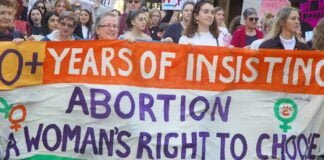On May 11, the ABC’s Four Corners ran a program exposing numerous cases of sexual abuse by National Rugby League (NRL) football players. The ensuing media frenzy unleashed a barrage of sexism, reinforcing the legitimacy of sexual abuse against women and exposing the lie that we live in a “post-feminist society”.
The trauma experienced by “Clare”, a woman forced into group sex involving NRL superstar Matthew Johns and other Cronulla Sharks footballers, was at the center of the Four Corners program.
“There was always hands on me… and if one person had stopped, someone else was touching me and doing something else. There was never a point here I was not being handled… I had my eyes shut. When I opened my eyes there was just a long line at the end of the bed… I thought I was worthless”.
Immediately, there was a fierce public backlash against “Clare”. All the old sexist stereotypes used to justify rape were trotted out.
Johns argued on A Current Affair that “Clare” had been, “a willing participant in everything that went on”. This, despite his acknowledgement that the other players had never been invited into the room and all thought of “Clare” as nothing but a sex-object.
The Hotel owner and “Clare’s” former boss were quoted extensively in the media arguing that she had “told a whole bunch of lies” and had been heard “crowing” about group sex with footballers—implying that her sexual history somehow justified the attack.
Over 220,000 people joined a “support Matthew Johns” Facebook group, which was plastered with comments like “she is a slut” and “she loved it”.
Matthew Johns may have been stood down from Channel Nine and other official positions amidst widespread reporting of a “crisis” in the NRL.
But overwhelmingly, criticism took the form of moralising about the “unsavoury culture of group sex” within the code, rather than being clear that what happened to Clare and many others who spoke out on Four Corners was rape.
A wider sexism
Most analysis of the incident argued that there was something particular about footballers that could explain the Four Corners revelations. The program itself claimed, “the relentless violence of the game creates an obvious problem, how do you create gladiators who don’t take risks off the field?”
But sexism and sexual abuse of women takes place across society. One in five Australian women over the age of 15 report being subject to sexual violence at some stage in their life and 78.2 per cent of attacks come from men known to these women.
The fact that the wave of reporting on the NRL scandal served to shore up the idea that sexual abuse is acceptable demonstrates how deep-seated it is.
Widespread sexual abuse is just one feature of the persistent oppression of women. This oppression results, not from football, or the supposed “natural urges” of men, but from the structural position of women under contemporary capitalism.
It roots lie in the nuclear family, which forces women into unpaid domestic work and taking responsibility for reproducing the labour force. This unpaid domestic labour remains crucial for the system today, and relies on ideas of women’s inferiority.
Throughout the NRL scandal, the virtues of the nuclear family were pushed as the alternative to “immoral” group sex. Matthew Johns sought public sympathy by presenting himself as a “family man”, being interviewed with his wife and claiming that “infidelity” had been his only crime.
Economic changes in the 20th Century, and the emergence of the women’s liberation movement from the 1960s, created possibilities for far greater freedom for women.
But many of these advances have also opened new frontiers of inequality. Women’s participation in the workforce has drastically accelerated. But many women are hyper-exploited, earning considerably less than men. The Sex Discrimination Commission says that women working full-time earn only 83 per cent of full-time male wages.
Women are also concentrated in part-time and casual work, where the figure is just 63 per cent of male earnings. Often, these positions are the first to go in times of economic slowdown—meaning the brunt of the current recession is being born by women.
The sexual freedom fought for over generations has been fiercely commodified. Images of women as sex-objects are plastered everywhere to sell anything from cars to watches.
“Clare’s” rape and the disgraceful response are just the most shocking example of a wider sexism, created by our capitalist society which relies on the systematic oppression of women.
by Paddy Gibson





